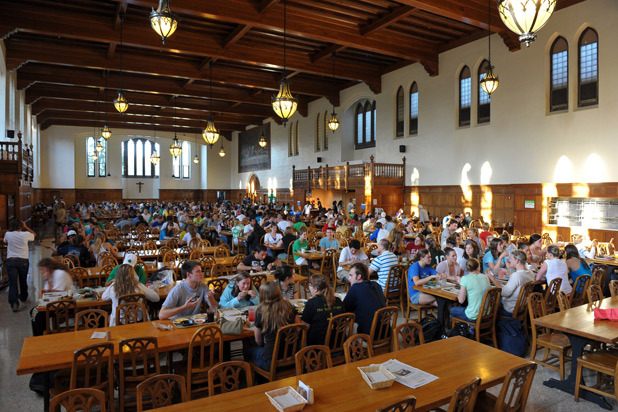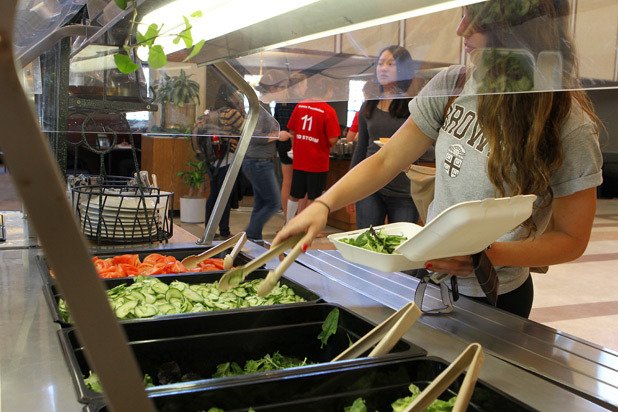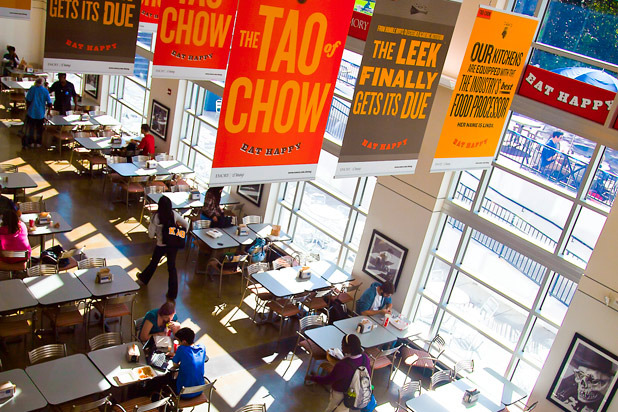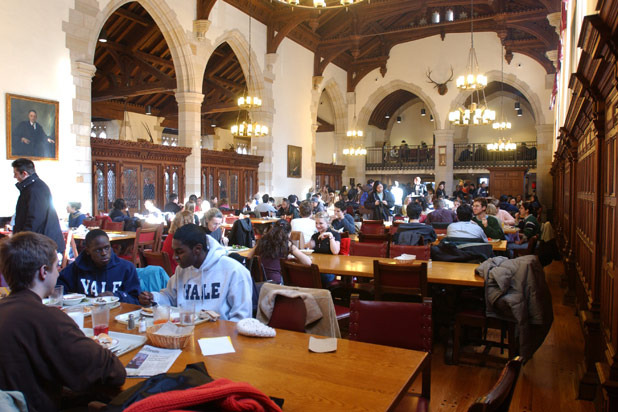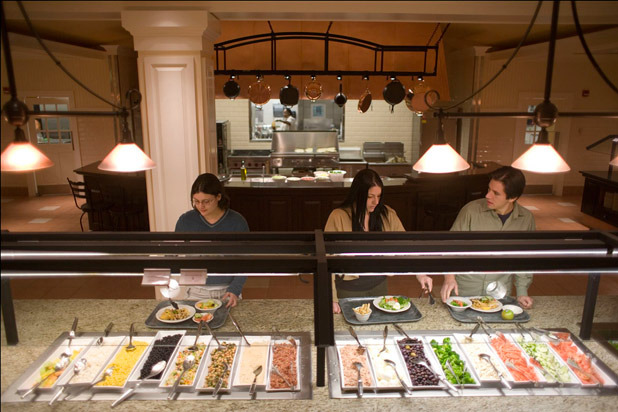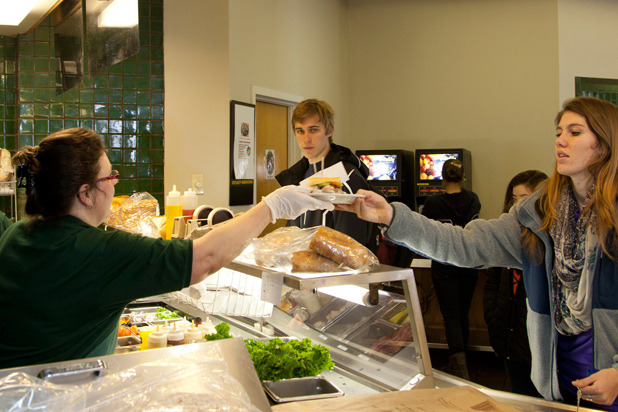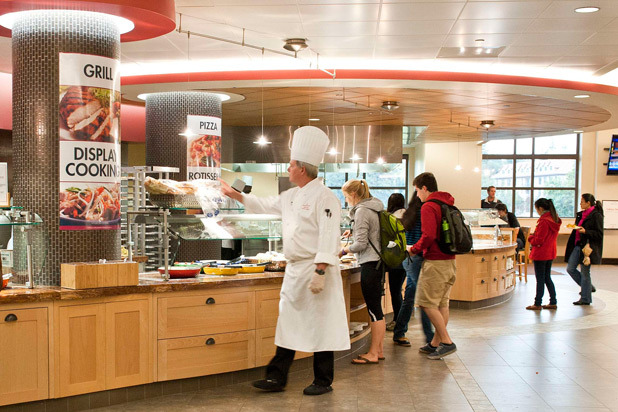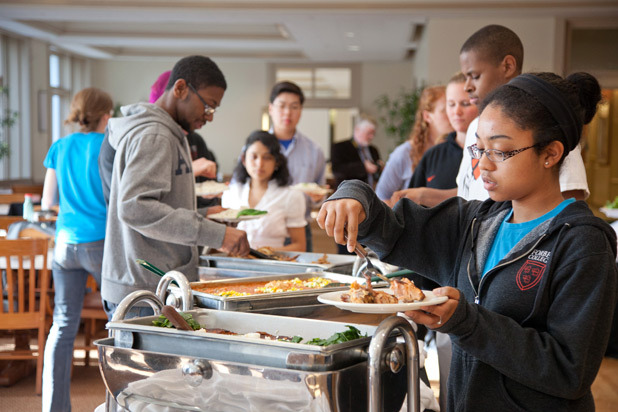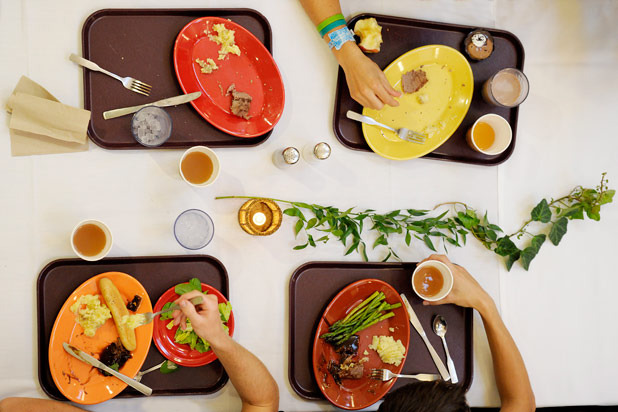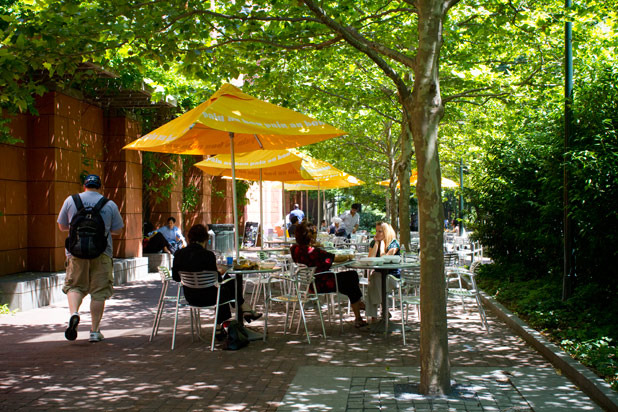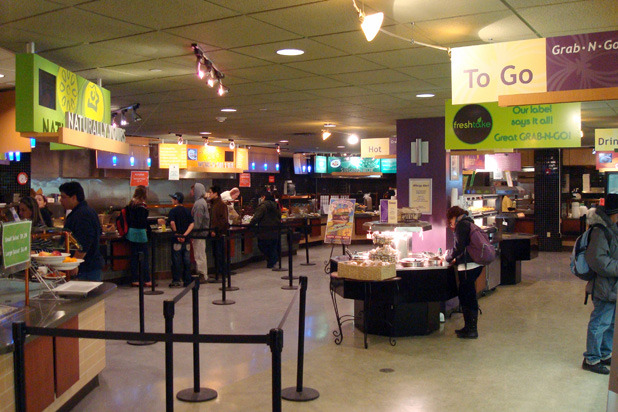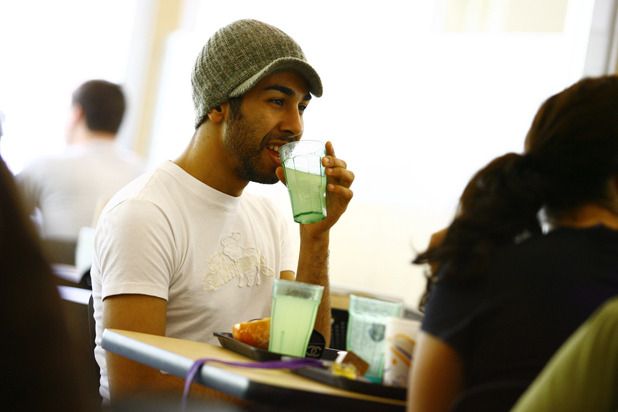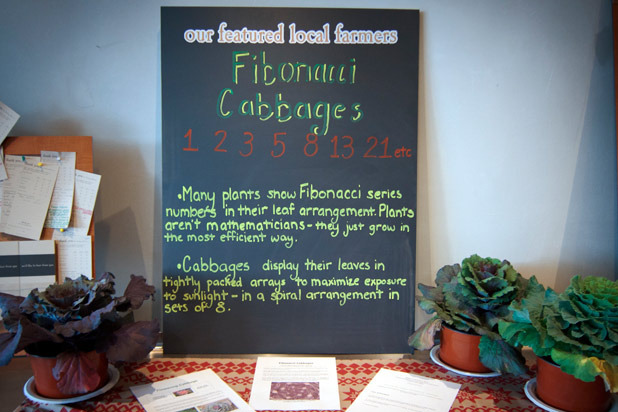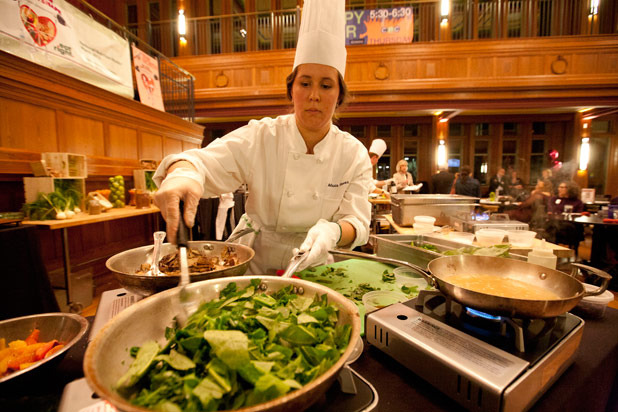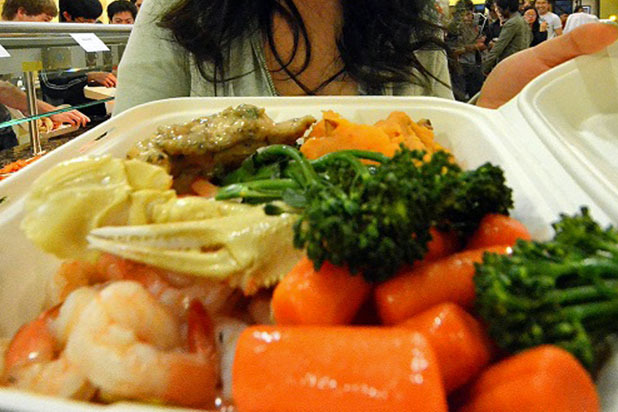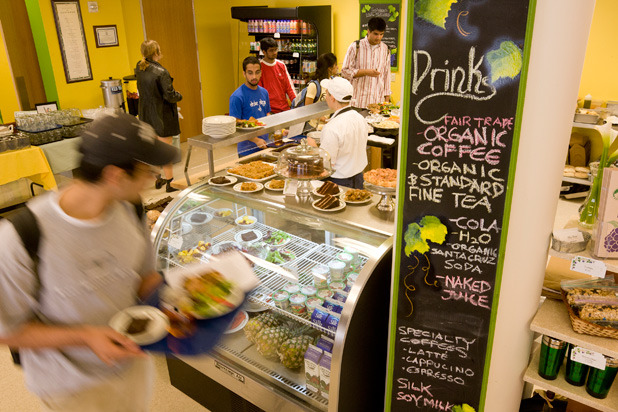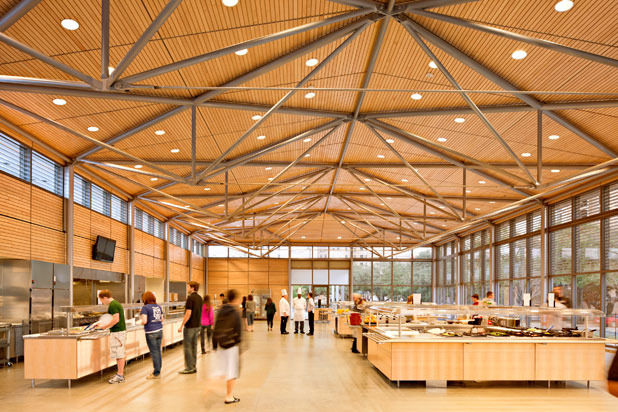America's Top Universities For Food Lovers Slideshow
According to Mike Davy, manager at Notre Dame Food Services, "Today's college student is much more worldly and sophisticated, in that they've been exposed to much more than the prior generation." He continues, "College food service has had to adapt to satisfy those needs." And Notre Dame is certainly evolving to accommodate those needs.
Classes like "Crave-able Vegetarian Cuisine," a hands-on cooking class held in the university's test kitchen, keep food exciting at this Indiana university, which also features two main dining halls, a food court, and restaurants and eateries. Notre Dame also has a meal exchange program with St. Mary's College. Sample meal items include fried eggs, and bourbon baked ham. Menus note healthy choices, gluten-free items, and varied options for vegetarians and vegans. The university even provides sick meals to those who are ill or confined to their rooms.
The home of the Fighting Irish sets itself apart with Legends of Notre Dame, a restaurant and pub thats a collaborative effort between food services and the student activities department. Thursday through Friday, the space is reserved for student programming from karaoke to comedy to DJs. All profits are shared with the activities department, creating a fun and tasty resource for student programming.
#18 Brown University (Originally #15)
Called "the Ratty" by students, the Sharpe Refectory is the dining hub of this Providence campus. Offering buffet-style dining, this spot is home to themed dinners several times a year, and doles out birthday cake on the last Fridays of each month.
Menu items include raspberry and white chocolate muffins, grilled Caribbean jerk chicken, and vegan roasted vegetable couscous. Observant Jewish and Muslim students: Brown has your back. With plenty of kosher and halal dining options available, adhering to dietary laws is a no-brainer. Veggie lovers are also cared for with an exclusively vegetarian snack bar available in the evenings.
Reusable containers, farmer partnerships, and student composting are just a few of Brown's sustainability initiatives. The university also hosts a farmers market Thursdays in the fall that supports local food.
#17 Johns Hopkins University (Originally #13)
Hormone-free milk and bio-degradable containers are just two ways Johns Hopkins is working to provide what it calls "responsible dining." According to David Furhman, director of dining programs, the university composts 90 percent of its waste.
Proud of the entire campus dining system, Furhman says, "Simply put, we believe in offering the best quality possible. For instance, we use Boar's Head brand meats and cheeses exclusively, our french fries are hand-cut from potatoes, and we use only all-beef kosher hot dogs and artisan breads and pastries." Menu options include Texas toast French toast, Mahimahi summer grill, and lentil sloppy Joes.
The Baltimore-based university's dining facility is peanut- and tree nut-free, gluten-free, trans-fat-free, and vegan- and vegetarian-friendly. There is also a kosher eatery.
Hopkins Sterling Brunch, held four times a year, is a big hit. The meal brings "a special hotel-quality brunch to our campus community complete with smoked salmon, shrimp cocktail, dramatic ice carvings, and a live jazz band," says Furhman. No wonder it's so popular.
#16 University of Chicago (Originally #5)
Vegetarian, vegan, kosher, halal, and gluten-free — UChicago's got it all. With three residential dining halls, 12 cafés, and two markets, this university certainly isn't lacking options. Each student is assigned a "house table" in one of the dining halls where they can share meals with friends.
Offering study break orders for those unable to tear themselves away from the books, UChicago's menus include waffle bars, polenta with broccoli rabe and mushrooms, and Moroccan vegetable stew.
Want to "eat fresh"? The university has a Subway on campus, as well as Jamba Juice, Papa John's, and Einstein Bros Bagels — among other popular chains.
Committed to increasing the amount of locally sourced food on campus, the university also makes 25 percent of all retail and residential dining purchases from women-owned or minority-owned business.
#15 Emory University (Originally #20)
Tradition is huge at Emory, and that extends deep into the dining services philosophy. From the homecoming weekend barbecue to the Thanksgiving-inspired heritage harvest feast that highlights the seasons produce, Emory strives to offer convenience, flexibility, and variety.
Kenny Hemmer, interim executive director of the Food Service Administration, is extremely proud of the dining facilities. Offering meals like lasagna, toasted grilled veggie and balsamic sandwiches, and sushi, the university seeks to serve the freshest food possible. "It doesn't get shipped in every morning — it gets made here," says Hemmer of the sushi.
Home to chains like Chick-fil-A and Starbucks, the university recognizes the need to balance student wants with student needs. Emory's dining student task force illustrates the importance it places on customer feedback. "It's students talking to students about food," says Hemmer.
What's next? A renovation of the main dining hall this summer, and the arrival of a Dunkin' Donuts. You can almost hear the cheers.
#13 Columbia University (Originally #4)
Can't concentrate on your Comparative Lit reading because your sweet tooth yearns for chocolate? No problem. Columbia Dining's web site features a "Whatcha in the Mood For" search that helps students quash killer cravings by locating the source right on campus.
The New York-based university has joined the war on trans fats by eliminating margarine, using trans fat-free products like Tyson's chicken, and opting for healthier french fries and peanut butter. Columbia offers kosher and halal dining and has taken measures to protect those with food allergies. Of the 13 dining hall and retail locations on campus, two have removed nuts and seeds from all recipes. In addition, special refrigerators have been designated for gluten-free items.
Supporting the community is also big on Columbia's to-do list. The university not only features produce from local farmers, but also donates leftover food to City Harvest, a nonprofit organization that collects food donations for those in need.
Food offerings include ham and potato frittatas, mac and cheese with mustard greens, and tabbouleh. Nutrition information is available online, as are guides that indicate the correct serving for each of the food groups.
#12 Yale University (Originally #3)
The dining program at Yale can be summed up in three words: organic, sustainable, local. Want to see where the chicken you just ate was raised? Done. Students can view the exact farm on Google Earth with a production code provided by the dining hall manager.
With a menu that labels 15 common food allergies and dietary restrictions, from alcohol to peanuts, and an app that allows students to see seating availability within dining halls, based on food transaction data, Yale clearly isn't messing around. Sample menu items include steel-cut oats, Korean BBQ tofu tacos, and baked orzo ratatouille. Vegan and vegetarian entrées are available at every meal.
Yale has zeroed in on the importance of sustainability, and offers humane-certified eggs and chicken, antibiotic-free beef, and both fair-trade and organic coffee and tea at its dining establishments. The university has also committed increasing the use of locally preserved products, sustainable procurement, and to using 50 percent vegetarian-fed, grass-raised beef — all by 2013. Go Bulldogs.
#11 Harvard University (Originally #1)
With events like "Top Chef Harvard," a competition between dorms to see which can create the best dish using only the ingredients found in the dining halls, this university makes food fun. So what's on the menu? Cage-free eggs cooked to order, tomato quiche, and quinoa and vegetable jambalaya, just to name a few. Vegetarian, vegan, local, and organic items are all available.
With 13 undergraduate dining halls, a kosher kitchen, and 14 retail spots, Harvard is certainly is no slouch when it comes to options. Thanks to a podcast announcing each week's menu, it's pretty easy to plan ahead in Cambridge. Those on the meal plan can place orders online up to a week in advance.
Heading off campus? The Crimson will even pack you a lunch, just like mom used to — sans the handwritten napkin note. Linked to each collegiate's ID number, the system keeps track of each student's food preferences.
#10 Dartmouth College (Originally #11)
Cod steamed in soy ginger broth, baked eggplant with miso dressing, and steamed Jasmine rice. Sounds like restaurant-quality fare, right? Nope, just dinner at Dartmouth, where vegetarian, vegan, halal, and kosher food is readily available. In fact, the college does all of the catering for the local synagogue.
Featuring guest chefs two or three times per term, and hosting a community picnic at the beginning of the year, Dartmouth knows who its audience is. Dave Newlove, director of dining services, is proud of the service provided. "We work for the student," he says of the 400-person staff that includes students and special needs employees.
Dartmouth has six main dining spots, and recently renovated one — Class of 1953 Commons — for a staggering $28 million. A gift from the class of 1953, the facility was originally built in 1927 and was ready for a makeover, according to Newlove.
Menu options include bacon, egg, and cheese biscuits; lemon-pepper salmon with roasted red potatoes and veggies; and artichoke and roasted pepper pizza. An online menu lists nutritional info, and an allergen filter allows students to customize the meal options to fit their needs.
#9 Stanford University (Originally #5)
Stanford can't be beat when it comes to community outreach. The university donates leftover food to the community's underserved residents, hosts holiday meals for those in need, and employs part of the staff from Abilities United, an organization for people with developmental and physical challenges.
Serving 3 million meals per academic year, Stanford's dining accommodations include 11 dining halls and 22 dining locations. Sample menu items include sweet potato bisque, meat lovers calzones, and dill-roasted carrots and parsnips. Vegetarian and vegan options are available, and the university has instituted a pilot program for kosher dining that offers dinner three times per week.
The university even encourages students to play with their food. Stanford's annual "Cardinal Cook-Off" lets students compete in an Iron Chef-like format using main ingredients like halibut and tofu. Think you have what it takes to compete?
#7 Princeton University (Originally #2)
"When I arrived at Princeton in 1992, we had one chef. Today we have 15 chefs in our campus kitchens," says Stu Orefice, director of dining services.
The home of the Tigers hosts themed dinners and holiday meals throughout the year. According to chef Brad Ortega, "These meals allow us to produce and present our product in a manner that is fun for staff and students. For us, these meals typify the idea of the breaking of bread being an enjoyable social experience."
The focus is always on quality. Princeton offers dishes like chocolate French toast, corn bisque soup, and Brazilian roast chicken.
Menus indicate which foods are vegan, which contain pork, and even label the level of carbon emissions for each item. As of February 2012, the university began providing ice cream, juices, and jams that are free of high-fructose corn syrup.
And the crown jewel? The Visiting Chefs Program, which features a re-creation of a chef's restaurant fare, served buffet-style. Past participants include: Ditka's, Tribeca Grill, and Smith & Wollensky.
#6 Vanderbilt University (Originally #17)
Every March, the USS Rand, an imaginary cruise ship, travels the world to bring Vanderbilt students the best in food. To do this, the university decks out the dining hall with props, actors, and food stations.
"We allow them to exercise their creativity," explains Camp Howard, director of Vanderbilt Dining, of the campus chefs. Other themed events have centered on Las Vegas and a Willy Wonka-inspired affair.
Keeping with the government's food guidelines, Vanderbilt's "menus and meals are really focused on the plate, rather than the stomach," shares Howard. What's featured? Sausage breakfast burritos, Texas Red chili, and chicken tikka masala. With a focus on community, Vanderbilt invites local farmers to chat with students over family-style meals. In addition, the institution donates food to the Dimas House, a local organization helping people recently released from prison get back on track.
#5 University of Pennsylvania (Originally #5)
Forget to put National Peach Cobbler Day on your calendar? Penn's got an event for that. And for National Pretzel Day. And for many other days you've probably never heard of.
Run by Bon Appétit, a food management giant that emphasizes fresh, sustainable food, Penn's dining strives to employ the farm-to-fork philosophy. With on-site farmers markets and celebrity chef book signings, this institution takes its food very seriously.
Featuring five residential spots and seven retail locations, the campus has plenty of places for starving undergrads to get their munch on. What's on the menu? Omelettes made to order, fried chicken with garlic mashed potatoes and green beans, and roasted eggplant.
#4 Cornell University (Originally #15)
"We work hard to ensure that dining at Cornell is more than a meal — it's an experience," says Karen Brown, director of Campus Life Marketing and Communications for the university. Want to see the best of campus dining via video? Cornell presents CU in the Kitchen, a series that highlights the food, people, and things that set Big Red's food service apart from the rest. Think of it as Food Network, but hyper-local.
Big on student engagement, the university hosts events like "A Night at Hogwarts," which featured British cuisine, butter beer, and chocolate frogs. On a more typical day, students can dine on pancakes and sausage, Ethiopian vegetable stew, and pork stuffed with apples. The Ithaca- based institution has more than 30 eateries.
Cornell offers promotions to encourage students to jump on the sustainability bandwagon. If you buy a mug on campus, you can get a large coffee, tea, or hot chocolate for the price of a small one. What's next? "Two goals for the coming year are to offer more late-night dining options, and to communicate with our customers better using social media and smartphone technology," hints Brown. Expect a new eatery in partnership with the Cornell Dairy as well.
#3 Northwestern University (Originally #12)
The Evanston, Ill., campus has six dining facilities that serve up eats like Western scrambled eggs; peanut butter, bacon, and apple sandwiches; and Tuscan kale salad.
Passionate about student engagement, the university hosts events like Moroccan Dinner and Reggae Night Dinner. "Last quarter we hosted our Global Chefs, chef Tomo Irsic from Slovenia and chef Joachim Suarez from Columbia for a week. They cooked menus from their cuisines in each of the dining halls," says Steve Mangan, managing director of Sodexo and Northwestern University's food service partnership.
Northwestern is also home to a branch of The Campus Kitchen, an initiative that helps students give back to the community by preparing meals and sharing them with the less fortunate. The university works toward sustainability by recycling its cooking oil and using bio-degradable bags on campus.
Predictions? "I've been telling my team that the next five years will be taking us back to the future, as we see more local, seasonal, fresh, simpler, and tastier menus and products come back into the marketplace," says Mangan. Sounds delicious.
#2 Massachusetts Institute of Technology (Originally #5)
What has more than 30 food spots, including dining halls, restaurants, cafés, and food trucks? MIT's campus, that's what. The university uses Bon Appétit, the food management company dedicated to sustainably raised and regionally sourced food. Vegans rejoice! Bon Appétit's commitment to quality means that produce is typically prepared and served within 48 hours. Kosher, halal, vegetarian, and vegan options abound. For those who prefer to cook their own grub, MIT has "Cook-for-Yourself Communities," located in seven residences. The university also has a weekly produce market.
From decorating cupcakes to pigging out at the late-night nacho fest, there is an event for everyone. Offering food-related events every day, MIT helps undergrads celebrate international cuisine with the "Taste of the World" series, which features the food of a selected country on a rotating basis. Every Thursday, the university offers cooking classes for those known to burn water.
On tap: Chocolate chip pancakes, chicken in coconut red curry sauce, and truffled roast beef with buttered leeks.
#1 Washington University in St. Louis (Originally #14)
From moonlight breakfast to barbecues to "Dine with a Dietician" classes, this university goes the extra mile to provide students with the best of the best, hosting five to 10 events per week. Want to learn how to roll sushi? Check out Studio 40, an open kitchen where students can take cooking classes, meet with chefs, and watch demonstrations.
Run by food management giant Bon Appétit, WU's dining features dishes like blueberry crepes, vegetarian chorizo and potatoes, and orange pork stir-fry, with vegan, kosher, and halal options available. Two years ago, the university opened the new Bear's Den, a facility with authentic food concepts, including two tandoori ovens tended to by trained chefs from Pakistan and India.
Jill Duncan, director of marketing and communications for Bon Appétit Management at Washington University, thinks the school's sustainability measures set it apart from the pack — specifically regarding its conversion of waste oil to biofuel, the composting of food scraps, and the commitment to local food.
Attention to student feedback is another source of pride. "We have a very open communication environment and our managerial team is extremely visible and interactive with all of the students," explains Duncan.
#14 California Institute of Technology (Originally #5)
Worried about getting homesick? Caltech serves up family-style dinners in the student houses Monday through Friday, so you can make friends while breaking bread with your peers.
Chandler Cafe offers the greatest number of options on the Pasadena campus, featuring everything from pizza to made-to-order sushi. A bakery, a soup station, and a Latin cuisine bar all provide interesting alternatives to salad and pasta.
Caltech's menus indicate which meals are safe for vegetarians and vegans, and also mark those with nuts. Sample food includes egg-in-the-hole, Southwest turkey burgers, and grilled pork chops Yucatn. Vegan, kosher, and halal options are always available.
Need a hit of caffeine? The coffeehouse on campus supplies coffee, lattes, and smoothies to power those late-night study sessions.
#8 Duke University (Originally #10)
Food truck fanatics, this is the university for you. Got a hankering for Korean barbecue, handmade pizza, or burgers? No need to leave campus. Duke features a variety of food trucks and provides a Google calendar with times and locations so students can get their favorite foods with ease.
With more than 30 eateries and delivery right to your dorm door, the home of the Blue Devils is the most accessible campus on this list. Another customer of Bon Apptit food management, Dukes menu items include breakfast all day, rotisserie chicken, and Asian stir-fry. The university also boasts a center for those with special diets, from kosher to Seventh Day Adventist.
Out late partying? Popular chains like McDonalds and Chik-fil-A are on campus for those in need of a greasy hangover remedy.
#20 Rice University (Originally #17, according to U.S. News & World Report)
Heading here next fall? Be sure to check out the Rice University Farmers Market, a weekly market offering artisanal breads, handmade goat cheese, and on-site knife, scissor, and tool sharpening. The market is located next to Rice Stadium, and open every Tuesday.
Rice's six residential dining facilities serve up items like quiche Lorraine, tilapia with chipotle-lime vinaigrette, and garbanzo potato curry. The university kitchens are trans-fat free, and the only coffee available on campus is fair-trade. A Mediterranean grill, a full-service java bar, a Chinese food restaurant, and a pub for graduate students are among the retail outfits available.
Big on sustainability, Rice has been practicing tray-less dining for three years to reduce waste. The university spends about 30 percent of its food budget on local fare, and uses food waste to make compost.
